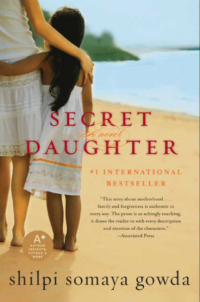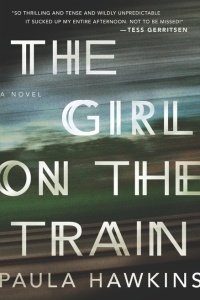It was like when you make a move in chess and just as you take your finger off the piece, you see the mistake you’ve made, and there’s this panic because you don’t know yet the scale of disaster you’ve left yourself open to.
Kazuo Ishiguro, Never Let Me GoNot only was it impossible to truly belong in America, but he didn’t fit in here anymore either. He was a dweller of two lands, accepted by none.
Shilpi Somaya Gowda, The Golden Son
 Anil Patel, the “golden son” in Shilpi Somaya Gowda’s insightful new novel, is torn between his desire to pursue an independent life and career in the United States and his obligations to his family and community in India. The story of an immigrant feeling untethered both in his adopted country and his native land is a familiar one, but The Golden Son offers a fresh perspective.
Anil Patel, the “golden son” in Shilpi Somaya Gowda’s insightful new novel, is torn between his desire to pursue an independent life and career in the United States and his obligations to his family and community in India. The story of an immigrant feeling untethered both in his adopted country and his native land is a familiar one, but The Golden Son offers a fresh perspective.
Anil, the eldest son of a prosperous landowner, is the first in his family to pursue higher education. As a child, he witnesses a baby girl, initially rejected by her parents because of a cleft palate, given “a smile as beautiful and perfect” as that of her siblings through the miracle of modern medicine — and through the efforts of Anil’s father, the wise village arbiter. Anil’s destiny is to become a doctor himself, as well as to follow in his father’s footsteps and negotiate all the disputes, minor and major, in his community.
As the successful eldest son in the family, Anil is unprepared for how inadequate he feels both in his roles as medical intern and village peacemaker. In an interview on “The Morning Show” on Canadian TV, Gowdi, the daughter of Indian immigrants, says her inspiration for the novel was her experience observing the tradition of the elder male as the family arbiter: “I thought it would be interesting to build a character who gets pulled into that type of role, perhaps when he’s not ready for it and doesn’t really want it.” In an interview with BookPage, she said:
I have long been intrigued by the Indian tradition of settling disputes within a community. I grew up hearing stories about lives that were changed: women granted divorces from abusive marriages, for example, before there were laws in place to protect them. Of course, not all disputes were settled happily, and afterward they had to go back to living together in the same community. It’s so different from the nearly anonymous, transactional way we administer justice.
The host of “The Morning Show” (who I doubt read the book) described The Golden Son as “‘Grey’s Anatomy’ meets ‘Slumdog Millionaire'”, which is a silly comparison because the only thing The Golden Son and “Slumdog Millionaire” have in common is that they both take place in India. However . . . fans of medical dramas (on screen or on the page) will love The Golden Son. The medical scenes, which take place in settings as varied as a busy inner-city emergency room, a high-tech cardiac catheterization lab and intensive care unit, the bedside of a cancer patient, and a makeshift clinic in a rural Indian village, are vivid and authentic. Gowda, who says she is “humbled by the nobility of the medical profession”, interviewed many patients and medical professionals as part of her research process. Her own father-in-law and brother-in-law are physicians.
When Anil begins a new life as a physician in the United States, he leaves behind not only his family, but his childhood friend, Leena. Her family, less prosperous than the Patels, arranges a marriage for her that turns out to be a colossal mistake. Gowda presents the story of Leena’s misfortunes as a parallel narrative to Anil’s story, building tension as the reader anticipates the moment when they come together.
The novel really develops momentum in the second half, as subplots involving Leena’s family and in-laws and Anil’s roommates, girlfriends, colleagues and supervisors all intertwine, with a surprising and satisfying ending. The novel both begins and ends with a chess game, with the game of chess as a metaphor for life recurring throughout the book. It’s not a subtle metaphor, but this isn’t an esoteric book. It’s a sincere, well-structured novel about, as the author notes, “the universal truths across cultures”.
 I also enjoyed Gowda’s bestselling debut novel, The Secret Daughter, about an Indian girl, adopted by an American couple, who decides to return to her birth country. A fascinating in-depth interview with Shilpi Somaya Gowda, in which she discusses both her novels, as well as her background growing up in two countries (Canada and India), her writing process, the status of women in India is available as a webcast on the Amnesty International Book Club website.
I also enjoyed Gowda’s bestselling debut novel, The Secret Daughter, about an Indian girl, adopted by an American couple, who decides to return to her birth country. A fascinating in-depth interview with Shilpi Somaya Gowda, in which she discusses both her novels, as well as her background growing up in two countries (Canada and India), her writing process, the status of women in India is available as a webcast on the Amnesty International Book Club website.
 Almost Famous Women autographed copy (Megan Mayhew Bergman) — This collection of “off-the-radar” female historical characters is going to the top of my pile.
Almost Famous Women autographed copy (Megan Mayhew Bergman) — This collection of “off-the-radar” female historical characters is going to the top of my pile. Villa America (Liza Klaussmann) — Historical fiction about Sara and Gerald Murphy, contemporaries of Hemingway and Fitzgerald, and their adventures with fellow expatriates on the French Riviera. Our hostess adored Jess Walter’s Beautiful Ruins — I think Villa America will be perfect for her.
Villa America (Liza Klaussmann) — Historical fiction about Sara and Gerald Murphy, contemporaries of Hemingway and Fitzgerald, and their adventures with fellow expatriates on the French Riviera. Our hostess adored Jess Walter’s Beautiful Ruins — I think Villa America will be perfect for her. The Bee Cottage Story: How I Made a Muddle of Things and Decorated My Way Back to Happiness (Frances Schultz) — The member who ended up with this book hasn’t made a muddle of things, but she is in the middle of building and decorating a new house, so it’s perfect for her.
The Bee Cottage Story: How I Made a Muddle of Things and Decorated My Way Back to Happiness (Frances Schultz) — The member who ended up with this book hasn’t made a muddle of things, but she is in the middle of building and decorating a new house, so it’s perfect for her. A Little Life (Hanya Yanigihara) — Two members brought copies of this devastating and powerful book, and both were stolen three times, rendering them dead.
A Little Life (Hanya Yanigihara) — Two members brought copies of this devastating and powerful book, and both were stolen three times, rendering them dead.








